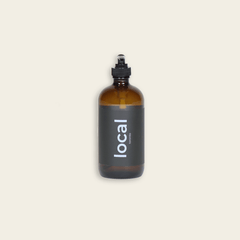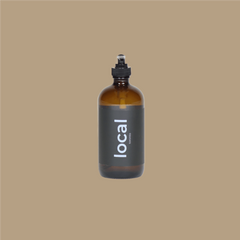Perfumery Alcohol (similar to isopropyl alcohol also known as rubbing alcohol) can be used in perfume formulations, surface cleaners, glass cleaners, room sprays and more! You can also add it to hand sanitizer and foaming hand soap recipes for extra disinfecting power but keep in mind it is strong and can be drying for the skin. We recommend adding a carrier oil such as Argan Oil, Jojoba Oil, Fractionated Coconut Oil or Vitamin E to help retain moisture and soften the skin.
Benefits
- Perfumery Alcohol acts as an emulsifier in your DIY recipes by allowing essential oils to evenly disperse in water-based solutions. Oil and water do not mix, so without an emulsifier such as alcohol, a carrier oil or Epsom salt, your essential oils remain clumped and undiluted on the surface of the water which may cause skin irritations.
- 200 Proof Perfumery Alcohol is an extremely effective disinfecting agent in household cleaners and other recipes.
- Alcohol evaporates quickly and will not sit on surfaces which is why it works so great in room sprays, glass cleaners, hand sanitizer and perfume formulations.
- For a limited time only, find Perfumery Alcohol - 200 Proof in our shop (available here).
Perfumery vs Rubbing Alcohol
Now you're probably wondering what the difference is between perfumery alcohol and your standard rubbing alcohol. Well, great question...
- Perfumery Alcohol is ethanol that has been denatured (made so it cannot be consumed) whereas rubbing alcohol is isopropanol.
- Perfumery Alcohol is similar to high-proof Vodka or Everclear. It is believed to have less of a "boozy" alcohol smell than regular rubbing alcohol.
- It can safely be used in a hand sanitizer and other disinfectants if that’s what you’re looking to make.
- We carry 200 Proof Perfumery Alcohol meaning it is stronger than a lot of the rubbing alcohol available at your local drugstore (if you can find any due to high demand). If you’re using rubbing alcohol in a hand sanitizer, it should be at least 91% in strength.
Ways to use perfumery alcohol:
Makeup Brush Cleaner *updated
In a small dish, add one part perfumery alcohol, one part water. You can also add in a few drops of carrier oil to help soften your brushes. Use your judgement depending on how dirty your brushes are and how many you need to clean. You should make enough solution that the bristles can be dipped and coated without touching the ferrule (the attachment where the bristles are joined to the handle). Add a couple drops of tea tree essential oil and gently swish your brushes around in the dish for about 30 seconds. You will notice that your brushes start to look cleaner and your mixture starts to look dirtier. Alternate between gently patting the bristles on a clean towel and swishing them in the solution.
You may need to refill your dish with fresh alcohol if you have a lot of brushes that need cleaning. We suggest doing them in batches.
Next, run the tips of your brushes facing downward under warm water and pat them on a clean towel to ensure they are clean and squeeze out any excess water. Reshape your bristles and lay them to dry (elevated or hanging) for a few hours.
Hand Sanitizer
Please note: This recipe includes at least 60% alcohol content to ensure effectiveness (as advised by the CDC).
What you'll need:
- 30 ml Glass Mister Bottle
- 4 tsp Perfumery Alcohol (or 91-99% isopropyl alcohol, otherwise known as rubbing alcohol)
- 1/2 tbsp Aloe Vera Gel Juice
- 1/2 tsp of Vitamin E, Jojoba, Argan or Fractionated Coconut Oil
- 20-30 drops of Essential Oil (see below)
Notes:
- Combine ingredients in your 30 ml mister bottle and shake.
- Spray enough sanitizer to cover both hands entirely. Rub your hands together (both sides and in between fingers) until dry.
- Essential oils add a boost to your hand sanitizer. If you use dōTERRA or Young Living essential oils, add their On Guard or Thieves blend to the recipe. Otherwise, Lemon, Peppermint, Tea Tree, Clove, Cinnamon and Eucalyptus are excellent essential oils to use in your hand sanitizer. Not only do they smell amazing but they have cleansing properties as well.
- Aloe Vera Gel Juice is known to have antioxidant & antibacterial properties.
- Vitamin E, Jojoba, Argan & Fractionated Coconut Oil help to keep your skin soft & moisturized.
- Perfumery Alcohol (200 Proof) is an effective disinfecting agent and acts as an emulsifier in your liquid formulations (allows your essential oils to stay suspended).
Surface Disinfectant Spray
This natural cleaner can be used safely throughout your home to disinfect countertops, remotes, knobs, switches, toys & other frequently touched surfaces. You can even use this to wipe down your car interior and handles.
- 16 oz Glass Spray Bottle
- 2 tbsp Castile Soap
- 1/4 cup Perfumery Alcohol - 200 Proof or 91-99% Rubbing Alcohol or white vinegar if you don't have either
- 30 drops essential oil (see below)
- Distilled water
Notes
- Combine ingredients in your 16 oz Glass Spray Bottle, top with distilled water and shake.
- Essential Oils: 20 drops Lemon + 10 drops Tea Tree or 10 drops Orange + 20 drops Protective Blend (On Guard by dōTERRA or Thieves by Young Living).
- Shake, spray & wipe down surfaces with a cloth or paper towel.
- We love the 16 oz size bottle because you don't have to worry about running out for a long time! If you're making this in an 8 oz bottle, divide the recipe in half.
Shoe Deodorizer
What you'll need:
- 30 ml Glass Mister Bottle
- 2 tbsp Perfumery Alcohol or Rubbing Alcohol (isopropyl alcohol)
- 5 drops Tea Tree Oil
- 5 drops Lemon Oil
Notes:
- Combine all ingredients in a 30 ml Glass Mister Bottle and shake well. Remove soles and spray the inside of each shoe before allowing to air dry. Goodbye smelly shoes!
- Lemon and Tea Tree essential oil have purifying and cleansing benefits. Tea Tree also has antibacterial properties.
Glass Cleaner
Use this recipe to clean windows, mirrors and glass furniture around your home!
What you'll need:
- 8 oz Glass Spray Bottle
- 3 tbsp Perfumery Alcohol or Rubbing Alcohol (isopropyl alcohol)
- 2 tbsp White Vinegar
- 1 tsp Cornstarch
- 5 drops of any citrus oil (orange, lemon, lime, grapefruit)
- Distilled Water.
Notes:
- Combine ingredients in your 8 oz Glass Spray Bottle, top with distilled water and shake. Spray down glass surface and wipe using a microfibre cloth in a circular motion until clean.
- Alcohol allows your solution to quickly evaporate so your glass is shiny and streak free. It also acts as a disinfecting agent.
- Vinegar helps to remove any film, smudges or residue.
- Cornstarch gently buffers to ensure your surface is polished and streak free (it's the secret ingredient).
- Citrus essential oils have a fresh aroma and cleansing properties.
Room Spray
What you'll need:
- 120 ml Glass Mister Bottle
- 1 tbsp Perfumery Alcohol or Vodka or Rubbing Alcohol (isopropyl alcohol)
- 10-15 drops of Essential Oil (see below)
- Distilled Water
Notes:
- Combine ingredients in a 120 ml Glass Mister Bottle and top with distilled water. Spray the air to freshen up your room.
- You can use any combination of essential oils but if you need a few suggestions you can try: 5 drops Lavender + 2 drops Bergamot + 2 drops Lemon + 1 drop Rosemary + 1 drop Sandalwood or 3 drops Lemon + 3 drops Grapefruit + 3 drops Orange + 1 drop Peppermint.
- Alcohol helps your spray to evaporate quickly.
Essential Oil Perfume
Ditch the chemicals and synthetic fragrances for this natural perfume recipe!
What you'll need:
- 8 ml Twist & Mist Atomizer
- 10-15 drops of essential oil (see below)
- Top with Perfumery Alcohol or Vodka or Rubbing Alcohol (isopropyl alcohol)
Notes:
- Combine ingredients in your 8 ml Twist & Mist Atomizer. You may find that the scent develops over time.
- Here are two fabulous essential oil combinations to try: 2 drops Ginger + 5 drops Vetiver + 5 drops Grapefruit or 6 drops Orange + 2 drop Patchouli + 2 drop Ginger
- If you're interested, here is an in-depth blog post about layering and blending essential oils to make the perfect perfume.
Thanks for taking the time out of your day to read our blog post!
To shop Perfumery Alcohol while it is available, click here!
DISCLAIMER: Make sure you are using the safest essential oils available to you. We use Certified Pure Therapeutic Grade. All information mentioned in this blog post has not been evaluated by Health Canada or the FDA and is not intended to diagnose, treat, cure, or prevent any disease.




Leave a comment